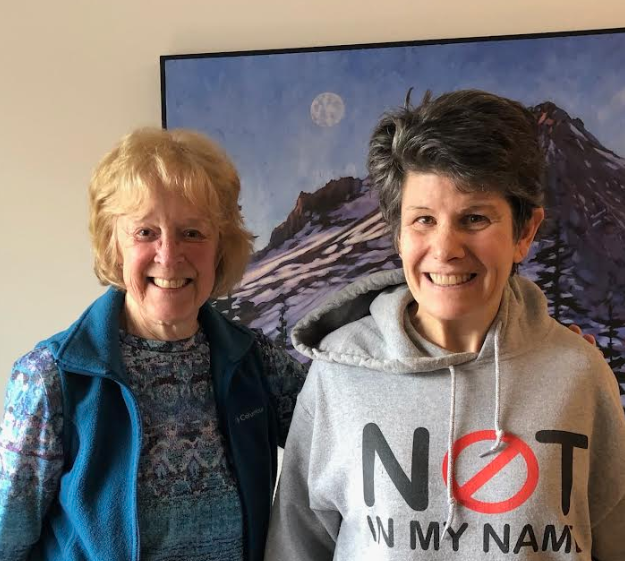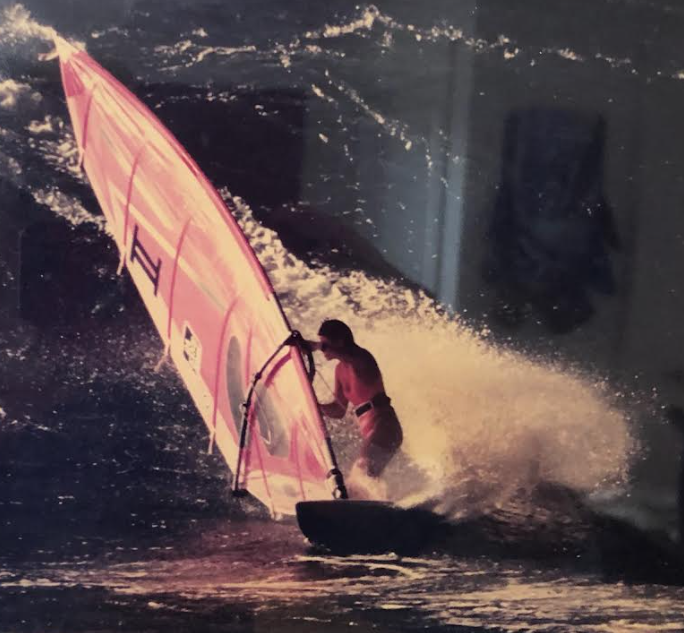Column: Gorge Games' unsinkable Peggy Lalor retools for the planet
Nancy Turner with Peggy Lalor, creator of the Gorge Games. Notice that sweatshirt Lalor’s wearing. There is no quit in this Nobel Peace Prize winner despite a major recovery from a car accident several years ago. Lalor has retooled and set her sights on saving the earth.
Editor’s Note - Our Nancy Turner is bringing us a two-part series on Peggy Lalor of Hood River.
By Nancy Turner
Do you know what former Vice President Al Gore, Ted Turner (communication mogul and humanitarian), the Dalai Lama, and Peggy Lalor of Hood River have in common?
Even if you ran into Peggy driving her convertible around town (a bad pun that will make sense as you read on), you would never guess. She’s not one to boast or rest on her laurels.
They each earned a Nobel prize.
Peggy earned Nobel’s Earth Service Award while she was director of the 1998 Timberland Gorge Games. She was recognized for her efforts to “set higher standards for humanitarian excellence and environmental stewardship” as creator and organizer of the Gorge Games, a 100% All Natural Sport and Music Festival.
The award was presented in person by Claes Nobel, a member of the famous Swedish Nobel family and descendant of Nobel Prize creator Dr. Alfred Nobel. This caught the attention of sports enthusiasts worldwide. Hood River became a destination for recreation.
Peggy was born and raised in Toronto, Canada. She was the middle child of five kids. Her parents loved swimming and golfing. All were competitive in sports except her sister, the baton twirler. Peggy was active in all kinds of sports, including snow skiing in the Rockies, but her true love was windsurfing. Getting in shape and learning the skills never felt like hard work because she liked it so much. She went to college for one year but then stopped. Windsurfing was more fun. That’s what initially brought her to the gorge.
Windsurfers began coming to the Columbia River Gorge at Hood River in the early ‘80s. They were drawn here by persistent winds of 25mph or higher. High basalt bluffs on both sides of the river create a natural wind tunnel. Hood River was struggling because of the decline of the timber industry. Thanks to the strong and steady gorge winds, kiteboarding and windsurfing were added to the traditionally popular sports such as kayaking, mountain biking, road cycling, salmon fishing, golf, winter skiing and snowboarding.
Hood River became a recreational paradise.
Lalor in a perfect place.
Peggy was in her element.
There were no role models and she had no prior experience as a windsurfer. She didn’t know what the hell she was doing. She made it up as she went along. People who helped her became friends. She persevered. She excelled. Sponsors such as Timberland, Nike, Subaru, National Geographic and Outside Magazine kept her afloat financially. She went to Maui, Hawaii to compete internationally in windsurfing. In 1984 she ranked #3 in the world in windsurfing.
That’s right, third top woman windsurfer in the world.
In 1996 she founded The Gorge Games, an annual summer sports extravaganza that included events for windsurfing, kiteboarding, kayaking, climbing, mountain biking and sailing. Top athletes from all over the world were attracted to these competitions. The Gorge Games ended in 2004, but their impact had been powerful.
Hood River was now on the map as a play zone.
And it would not be Lalor’s last major challenge.
All it took was a split-second accident in 2010 to completely change her life.
She was riding her bike to have a beer with friends in Calgary, Canada when a car ran into her. She suffered massive brain trauma. After 2.5 months in a comma, often near death, she slowly emerged. The medical staff suggested she had a poor prognosis.
They didn’t know Peggy.
In every photo taken during her recovery period, there’s a cheerful smile on her face. She figures she was just born a happy person. When faced with having to relearn life’s basic skills, she worked at it as if she aimed to earn a gold medal in the Olympics.
With her sense of humor and determination, she put her heart and soul into more than a decade of recovery. She is now able to walk safely inside her apartment and live independently.
She “drives” an electric wheelchair, which she calls her convertible. As she puts it, she has had three stages of life. Before the accident, the recovery phase, and now. Her goal now is to promote a healthy planet. More about that later.
It’s not possible to bask in past accomplishments and feel happy.
One can briefly enjoy the memory of the past, but that isn’t enough. We need current accomplishments, today. We like to think of our identity as fixed, but an illness, an accident, or aging can change us. Often this brings on a sense of meaninglessness and depression.
The best plan is to let go of the past and focus on the present. That’s when we need to build new strengths and new skills. That’s exactly what Peggy did. She turned her recovery into an adventure, with many obstacles to overcome, and ultimately she transformed herself from being a world-renowned windsurfer to one who gets around in a wheelchair and wants to save the earth.
Hers is a hero’s journey.
Despite brain trauma, Peggy maintained the ability to reason, think flexibly, and solve unusual problems. International folk tales and stories about the time in our lives when we usually retire have certain universal themes. They reveal to us what our tasks are at this time of life. One theme is that of role reversal. Peggy certainly has done that, going from someone in charge, earning international recognition for her windsurfing skills, and creating the Gorge Games, to one of complete dependence on others for survival for about a decade. Another theme is that it is one’s task to give back to our community the wisdom we’ve gained throughout our lives. People who sit around without contributing to others usually are less healthy and die earlier. Peggy has taken the idea of saving the earth as her new mission in life.
Some time ago, I watched the film, “Kiss the Earth,” on Netflix. It offers scientifically based ways to create healthy soil, therefore, healthy plants, healthy water, healthy animals, including humans, and a healthy climate.
The sequel is “Common Ground.” Peggy’s goal is to help us learn a successful way to stop using chemicals to grow our food. She is promoting free showings of this film in the gorge. I’ll tell you about this film and where to see it in Part 2 of this article. Stay tuned.
Support Local News
Available to everyone. Funded by readers.





